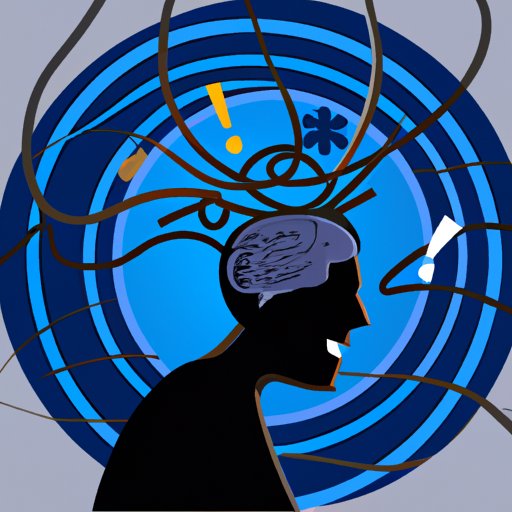Introduction
Mental health issues are conditions that affect a person’s thoughts, emotions, and behaviors. They can range from mild to severe, and include depression, anxiety, bipolar disorder, schizophrenia, and more. This article will explore the causes and symptoms of mental health disorders, their impact on society, available treatment options, common myths about mental health issues, the effects of stress on mental health, the role of genetics in mental health disorders, and the intersection of mental and physical health.

Exploring the Causes and Symptoms of Mental Health Issues
Mental health disorders can be caused by a variety of factors, including biological, psychological, social, and environmental influences. Common causes include genetics, trauma, abuse, and certain medications. Other possible causes include drug or alcohol use, major life changes, stressful events, or a lack of support from family or friends.
Common symptoms of mental health disorders can vary depending on the type of disorder and may include difficulty concentrating, changes in sleep patterns, low energy, feelings of guilt or worthlessness, difficulty making decisions, suicidal thoughts, and more. Some mental health disorders may also cause physical symptoms such as headaches, stomachaches, and muscle tension.
Examining the Impact of Mental Health Disorders on Society
Mental health disorders can have a significant economic impact, as they can lead to decreased productivity, increased medical expenses, and higher rates of unemployment. Additionally, people with mental health disorders may require more social services, such as housing assistance and job training.
Mental health disorders can also have a significant social impact, as they can lead to stigma and discrimination. People with mental health disorders may experience isolation, shame, and difficulty forming relationships. They may also be more likely to experience poverty, homelessness, and other social problems.
Investigating the Treatment Options for Mental Health Disorders
Treatment for mental health disorders is available and can often help people manage their symptoms and improve their quality of life. Treatment options include psychotherapy, medication, lifestyle changes, and alternative therapies. Psychotherapy is a type of talk therapy that helps people understand their thoughts and feelings, practice healthier coping skills, and develop positive coping strategies. Medication can help ease symptoms of mental health disorders, but it is not a cure. Lifestyle changes, such as exercise, healthy eating, and getting enough sleep, can also help reduce symptoms. Alternative therapies, such as art therapy, music therapy, and yoga, can help people manage their symptoms in a natural and non-invasive way.
Debunking Common Myths About Mental Health Issues
There are many myths and misconceptions surrounding mental health issues that can prevent people from seeking help. One common myth is that mental health disorders are caused by “weakness” or “laziness.” In reality, mental health disorders are complex conditions that can have multiple causes, and there is no one “right” way to cope with them. Another myth is that mental health disorders are incurable. While some mental health disorders may not have a “cure,” most can be managed with proper treatment.

Analyzing the Effects of Stress on Mental Health
Stress can have a significant impact on mental health, as it can worsen existing symptoms and even trigger new ones. It can lead to anxiety, depression, irritability, and difficulty sleeping. To reduce stress, it is important to make time for self-care, such as exercising, meditating, or spending time with friends and family. It is also important to practice good communication skills and find ways to express your emotions in a healthy way.

Examining the Role of Genetics in Mental Health Disorders
Genetics can play a role in mental health disorders, as some mental health disorders can run in families. However, it is important to remember that genetics are only one factor, and that other factors, such as environment, lifestyle, and personal experiences, can also influence mental health. Additionally, how a person responds to a mental health disorder can vary greatly between individuals.

Understanding the Intersection of Mental and Physical Health
Mental and physical health are closely intertwined, and both can influence each other. Poor physical health can lead to mental health issues, such as depression or anxiety, while poor mental health can lead to physical health issues, such as heart disease or high blood pressure. To maintain good mental and physical health, it is important to eat a balanced diet, get regular exercise, practice relaxation techniques, and establish a regular sleep schedule.
Conclusion
Mental health issues can have a significant impact on individuals, families, and society as a whole. This article has explored the causes and symptoms of mental health disorders, their impact on society, available treatment options, common myths about mental health issues, the effects of stress on mental health, the role of genetics in mental health disorders, and the intersection of mental and physical health. If you are struggling with mental health issues, please seek help from a mental health professional.
(Note: Is this article not meeting your expectations? Do you have knowledge or insights to share? Unlock new opportunities and expand your reach by joining our authors team. Click Registration to join us and share your expertise with our readers.)
